What just happened? We knew that PCIe 4.0 would lead to consumer SSDs with blistering speeds, and they're starting to arrive, including what is claimed to be the fastest M.2 SSD in the world—at least when it comes to read speeds.

The XPG Gammix S70, which comes from Adata, utilizes the PCIe 4.0 interface to reach sequential read speeds of 7,400 MB/s and sequential writes at 6,400 MB/s. That’s faster than the current speed leader, the Sabrent Rocket 4, which is rated at 7,000 MB/s—the same as the upcoming Samsung 980 Pro PCIe 4.0 M.2.
The XPG Gammix S70 isn’t number one when it comes to write speeds, though, as Sabrent’s SSD beats it by just 450 MB/s. Samsung’s product is slower, at 5,000 MB/s writes.
Adata’s SSD boasts XPG’s CoolArmor aluminum heatsink that uses a terraced structure design to increase its surface area for improved heat dissipation. Combined with the hollow chambers underneath for better airflow, the heatsink can reduce load thermals by up to 30 percent.
The drive offers plenty of other features: LDPC error correcting, AES 256-bit encryption, RAID engine support, Dynamic SLC Caching, and DRAM Cache Buffer. You even get a 5-year warranty.
Adata says there will be 1TB and 2TB versions of the XPG Gammix S70, though we still don’t know pricing or availability. Remember that to get the top speeds, you’ll need a motherboard that supports PCIe 4.0, which right now is limited to AMD’s X570 and B550. The SSD is backward compatible with PCIe 3.0, but you’re not going to get the same level of performance, of course.
https://www.techspot.com/news/86820-adata-unveils-world-fastest-m2-ssd.html

